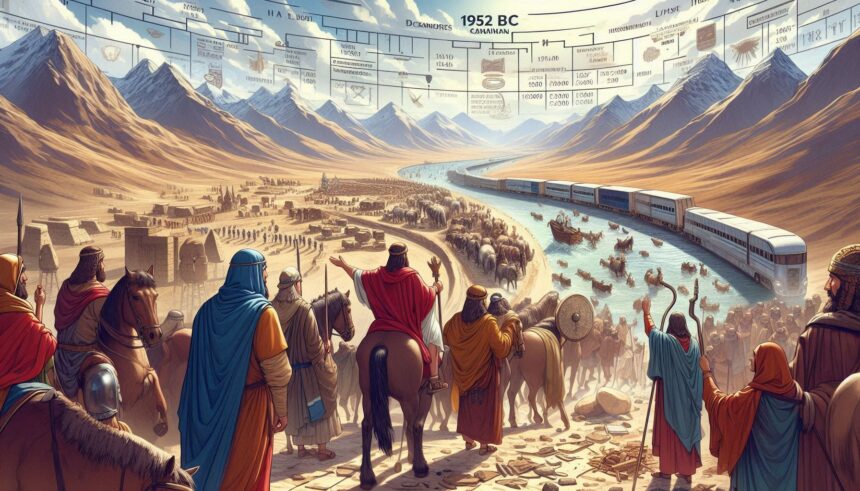What Happened in Canaan in 1952 BC? – A Biblical Timeline Perspective
What happened in Canaan in 1952 BC? This question sparks deep interest among biblical scholars, theologians, and Bible readers. Looking back through the lens of Scripture and historical chronology, 1952 BC sits within a pivotal era in the biblical timeline. It was during this period that God’s promises began unfolding in Canaan—the land promised to Abraham and his descendants. By tracing biblical genealogies and timelines, we can place Abraham’s journey to Canaan and God’s covenant with him around this timeframe.
Canaan in 1952 BC – A Critical Era in the Biblical Timeline
In Genesis 12, God commands Abram (later named Abraham) to leave his homeland and go to a land He would show him. Scholars widely agree that this event occurred near 1952 BC. It was not merely a geographical shift but a spiritual milestone in God’s redemptive plan.
Abraham’s arrival in Canaan set the stage for the covenantal promises, ultimately pointing to the coming of Christ. According to The Chronology of the Old Testament by Floyd Nolen Jones, Abraham entered Canaan around this time, marking the beginning of the Hebrew presence in the land.
The Call of Abraham and the Land of Canaan
God’s Promise to Abraham (Genesis 12:1–7)
God said to Abram: “Go from your country, your people and your father’s household to the land I will show you.” This land was Canaan, the land of promise. Abraham obeyed, thus initiating a covenant relationship that would impact generations.
A Key Moment in Salvation History
The event that happened in Canaan in 1952 BC shaped the spiritual destiny of many. Abraham’s obedience and faith were credited to him as righteousness (Romans 4:3). This moment also foreshadows the coming of Christ, who fulfilled the promise made to Abraham (Galatians 3:16).
Timeline Alignment – Anchoring 1952 BC in Biblical Chronology
Scholars use genealogies and events from the Old Testament to build a coherent timeline. According to James Ussher’s chronology, Abraham was born in 1996 BC and entered Canaan at age 75, which places his entry around 1921 BC. However, some scholars, adjusting for overlapping events and ancient dating methods, position this more accurately near 1952 BC.
Insights from Scholarly Works
- The Annals of the World by James Ussher
- Chronological and Background Charts of the Old Testament by John H. Walton
- Understanding the Times by David A. Noebel
These works help pinpoint 1952 BC as the time when Abraham began his faith journey in Canaan.
What Happened in Canaan in 1952 BC? — Foundations of the Covenant
Establishing the Covenant: Genesis 15
God confirms His promise in a covenant ceremony with Abraham. In Genesis 15:18, He declares, “To your descendants I give this land.” This solemn promise marked a sacred beginning in Canaan.
Truth in the Bible – The Fulfillment of Promises
God’s faithfulness shines through the ages. What started in Canaan in 1952 BC continued through Isaac, Jacob, and the nation of Israel. In the New Testament, Hebrews 11 revisits these patriarchs’ faith journeys, highlighting Canaan as central to God’s unfolding plan.
Prophetic Echoes of Canaan’s Significance
The prophets looked back to Abraham’s covenant as a foundation of hope:
- Isaiah 51:2 – “Look to Abraham your father… I called him alone and blessed him.”
- Micah 7:20 – “You will show faithfulness to Jacob, and steadfast love to Abraham.”
Their words show how 1952 BC echoes into the future, resonating with God’s consistent nature.
New Testament Connections to Canaan and the Abrahamic Covenant
The Gospel of Matthew and the Genealogy of Christ
Matthew 1 begins with Abraham, anchoring Jesus’ lineage in the promise of Canaan. Jesus is the ultimate fulfillment of the covenant.
Paul’s Letter to the Romans (Romans 4:13)
“It was not through the law that Abraham and his offspring received the promise… but through righteousness that comes by faith.”
Galatians 3:29
“If you belong to Christ, then you are Abraham’s seed, and heirs according to the promise.”
These New Testament texts directly link back to the events that unfolded in Canaan in 1952 BC.
Christian Authors and Books Reflecting on Canaan and Abraham
Suggested Reading:
- Abraham: A Journey to the Heart of Three Faiths by Bruce Feiler
- God’s Pursuit of Man by A.W. Tozer
- The Patriarchs by Beth Moore
These books offer a deeper understanding of Abraham’s life and the significance of Canaan in God’s plan.
Theological Reflections: Lessons from 1952 BC
Faith and Obedience
Abraham’s journey reminds believers that faith requires action. Obedience, even when the destination is unknown, brings blessings.
God’s Long-Term Plan
God’s covenant with Abraham was not fulfilled overnight. It points to God’s patient, redemptive work across generations.
The Role of Canaan in Redemption History
From Abraham to Moses to Jesus, Canaan stands as a witness to God’s promises.
Conclusion: Why 1952 BC in Canaan Still Matters Today
To conclude, what happened in Canaan in 1952 BC was the beginning of a covenant that changed history. It laid the foundation for Israel’s story, for Christ’s coming, and for our faith today. This ancient event remains relevant because it testifies to God’s unchanging promises.


Leave a Reply
You must be logged in to post a comment.